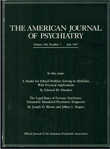Experience of Negative Symptoms: Comparison of Schizophrenic Patients to Patients With a Depressive Disorder and to Normal Subjects
Abstract
OBJECTIVE: Three hypotheses were tested: 1) schizophrenic patients would report more impairments on a self-rating scale for negative symptoms than normal subjects and attribute higher levels of distress to these impairments, 2) schizophrenic patients would report fewer impairments than patients with a depressive disorder and attribute lower levels of distress to these impairments, and 3) schizophrenic patients would attribute their impairments less often to mental illness than would patients with a depressive disorder. METHOD: A self-rating scale for negative symptoms was administered to 86 patients with schizophrenia, 20 patients with a depressive disorder, and 33 normal subjects. The scale items were derived from the Scale for the Assessment of Negative Symptoms (SANS). Two psychiatrists also rated all of the patients on the SANS. RESULTS: The hypotheses were supported. The differences between the two groups of patients in the rates of reported impairments and the levels of reported distress remained statistically significant after control for differences in age, sex, length of current admission, length of illness, dose of neuroleptic medication, use of clozapine, and severity of negative symptoms. CONCLUSIONS: The results suggest that a large number of schizophrenic patients are somewhat aware of negative symptoms but that they are less aware of these impairments and less concerned about them than are patients with a depressive disorder.



